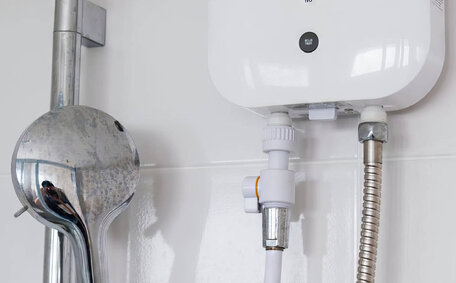What causes a rotten egg smell in hot water?
The primary culprits of hot water smelling like rotten eggs are:
- Sulphur-reducing bacteria (SRB) - These bacteria feed on sulphur and produce hydrogen sulfide, your water heater’s nemesis, as a byproduct, which has a rotten egg odour.
- Failing magnesium anode rod - Over time, the anode rod corrodes, creating conditions that allow SRB to thrive.
- Low pH water - Acidic water not just enables SRB growth and accelerates anode rod corrosion, but it may also lead to the need for water heater repair.
These factors combined allow SRB colonies to flourish, leading to the unpleasant odour in hot water when taps are turned on. When hot water courses through your faucets, the hydrogen sulphide gas is liberated, bestowing upon the water an unwelcome rotten egg smell.
Sulfur-reducing bacteria and hydrogen sulfide gas
Sulphur-reducing bacteria (SRB) are anaerobic bacteria that thrive in oxygen-deprived environments like water heaters, often resulting in a scent that can smell like rotten eggs. They feed on sulphur compounds and produce what is effectively your gas nemesis - hydrogen sulphide gas - as a byproduct of their metabolism. This gas has a distinct 'rotten egg’ odour that causes the unpleasant smell coming from hot water taps.
SRB necessitate a suitable environment, like your hot water heater being warm, to proliferate, potentially leading to water that smells like decay. The bacteria population increases over time if left unchecked, leading to instances where your water smells less than pleasant.
Although SRB are not a health risk, the odour they produce is highly unpleasant. Their presence also indicates issues within the water heater that might be causing the hot tap water to emit such odours, thus needing addressing. Maintaining proper water heater temperature settings between 49°C - 60°C can also help regulate SRB growth and manage issues when your water smells like sulfur effectively.
Replacing the anode rod, adjusting pH levels, or performing chlorine shock disinfection are effective strategies against water odours. But the root cause, such as corrosion, pH or temperature imbalance, which your system can suffer from, also needs to be rectified to prevent the bacteria from returning.
Corroded magnesium anode rods
Magnesium anode rods play an important sacrificial role inside water heaters. They actively corrode to prevent corrosion damage, guarding your tank against the smell coming your way from the detrimental effects of hydrogen sulfide.
Sulfur-reducing bacteria (SRB) flourish in the presence of corroded magnesium anode rods. As the rod corrodes, it raises magnesium concentrations and lowers pH levels in the water, which might smell like an unpleasant odour to users. This accelerates corrosion while supporting SRB colony growth.
When the rod fails, SRB pounce on the chance to feed, leading to a hot water smell that’s far from inviting. The hydrogen sulphide gas they produce as a byproduct escapes into the hot water, causing a potent rotten egg odour at the taps. Swapping out weathered magnesium anode rods eradicates this food source for sulfatereducing bacteria and aids in ensuring your hot water remains scent-free.
Annual checks can pinpoint deteriorating anode rods responsible for odours, potentially precluding more severe problems. Replacing them promptly prevents foul hot water smells and is a crucial step when you turn off your heater for maintenance.
How to get rid of rotten egg smell in water
Several techniques can eliminate the noxious rotten egg smell from your hot water system:
- Replace the anode rod - A new magnesium aluminum or powered anode rod can eliminate the SRB food source in your hot water tank, reducing the sulfide odour.
- Shock chlorination - Chlorine flushes eliminate bacteria, significantly reducing smelly water for an extended period.
- Adjust pH levels - Employing a water softener solution to elevate pH will stifle bacteria growth and abate your cold water smell, additionally guarding the anode rod and tank from excessive corrosion as water can be quite corrosive with low pH levels.
- Install a water filtration system - Filters for the whole house or specific points of use that remove sulphur and minerals can significantly diminish odours.
- Frequent flushing - Regular flushing addresses the question, 'why your water heater smells?' by clearing out sediment and bacteria that contribute to odours.
The most effective strategy is to determine and tackle the root cause, mitigating the sulfur smell and answering the pressing question, 'Why do I get a water heater smell?' by addressing factors such as sulfur bacteria, worn anode rods, improper pH levels or high sulphur content. Taking steps to control bacteria growth while optimising the hot water system environment provides a lasting solution.
Flush the water heater
Regular flushing of your water heater is a reliable method to eliminate rotten egg smells and temporarily enhance water quality:
- Turn off power to the water heater and lock the cold water inlet to maintain soft water supply.
- Connect a garden hose to the drain valve near the bottom of the tank.
- Route the hose to a nearby drain or outside area.
- Open the drain valve and let the water from the tank flow until it runs clear, flushing odours away from flowing back into your system.
- OPTIONAL: Mix 1 quart of household bleach or hydrogen peroxide into a bucket of water. Empty this mixture into the tank and allow it to settle for a few hours prior to draining.
- Close drain valve, disconnect hose, turn water back on and restore power once tank refills.
Regular maintenance flushing removes sediment and bacteria, which is essential if you’re experiencing persistent odours. Adding bleach or peroxide helps kill bacteria lingering inside the tank and pipes. This improves water quality and reduces smells.
However, if you notice a smell hot water emits after initial treatment, prevent the smell from returning by inspecting and replacing the anode rod if needed and optimising the system environment where bacteria can grow.
Replace the anode rod
Replacing the anode rod is one of the most effective solutions for getting rid of a rotten egg smell long-term. Over time, magnesium anode rods corrode, creating the right conditions for sulphur-reducing bacteria (SRB) to thrive and produce smelly hydrogen sulphide gas.
Switching from a magnesium rod to an aluminium or aluminium-zinc alloy anode rod increases the longevity of both hot and cold water systems. These materials are less reactive, so they corrode more slowly. This deprives SRB of their food source and discourages their growth.
Here are some tips for replacing your water heater’s anode rod:
- To proceed, turn your water heater off and shut down the cold water tap inlet valve
- Drain tank about 25% to access anode rod opening
- Remove old rod with a socket wrench and discard
- Use Teflon tape on threads and install new anode rod, tightening firmly
- Refill tank, restore water/power and check for leaks
With the right anode rod, SRB activity and rotten egg smells will be dramatically reduced. We recommend inspecting the anode annually and replacing again in 3-5 years if needed to maintain fresh water quality.
Install a water filtration system
Installing a whole-house or point-of-use water filtration system can help prevent rotten egg smells long-term. These systems are particularly effective for treating water only, harnessing a multi-stage filtration strategy to eliminate odours from contaminants like sulphur and sediments.
They’re installed on the main supply line near the water metre. Point-of-use filters, directly connecting to your tap, individually cleanse the tap water making certain that the water at each faucet remains pure.
Your household’s water firstly passes through a sediment filter to capture particulate matter.
Subsequently, a KDF filter uses copper and zinc to eliminate chlorine and sulphur.
Regular filter changes for filtration systems safeguard against scale and corrosion that lead to rotten egg smells. Pairing filters with anode rod replacement provides a comprehensive solution to bad hot water smells.
Preventing rotten egg smells from returning
To prevent the recurrence of the rotten egg smell in your hot water system, consider the following:
- Carry out your routine water heater flush every 6 months to remove any sediment buildup.
- Regularly inspect and replace the anode rod with an aluminium-zinc alloy model every 2-3 years to curb corrosion.
- Test pH levels yearly and use a mineral neutralizer to maintain proper pH between 7.2 - 8.5.
- Shock chlorinate the tank once a year to kill any stubborn sulphur bacteria.
- Consider installing a water purification system for the entire house or point-of-use filters for individual taps.
- Set your heater’s temperature between 49°C - 60°C to discourage bacterial growth that instigates the rotten egg odor.
By undertaking these preventative measures, you create an environment that prevents the bacteria behind the odour from thriving. It also optimises conditions inside your hot water system to keep water fresh, clean and odour-free for years.
When to call a professional plumber
If conventional troubleshooting methods like flushing or replacing the anode rod fail to remove the rotten egg smell, it’s time to call a professional plumber from Erskine Park Plumbing. A trained plumber possesses the know-how to tackle the problem your water system’s way, finding a lasting solution.
Our qualified plumbers systematically address the following water concerns:
- Inspect your water heater and pipes
- Test your water’s pH levels
- Check for signs of corrosion
- Detect leaks allowing bacteria to enter
- Replace parts like valves or anode rods
- Shock chlorinate the system
- Install filtration systems
- Adjust water chemistry
Our state-of-the-art equipment cleans water heaters, eliminates bacteria with high-temperature flushing, and prevents future bacterial growth. We thoroughly diagnose and resolve core issues, protecting your entire plumbing system against recurring problems.
Should the rotten egg smell persist or worsen, contact Erskine Park Plumbing at 1300 349 338 or via email at jobs@erskineparkplumbingservices.com.au. Our capable team can solve hard-to-fix water odour problems.






